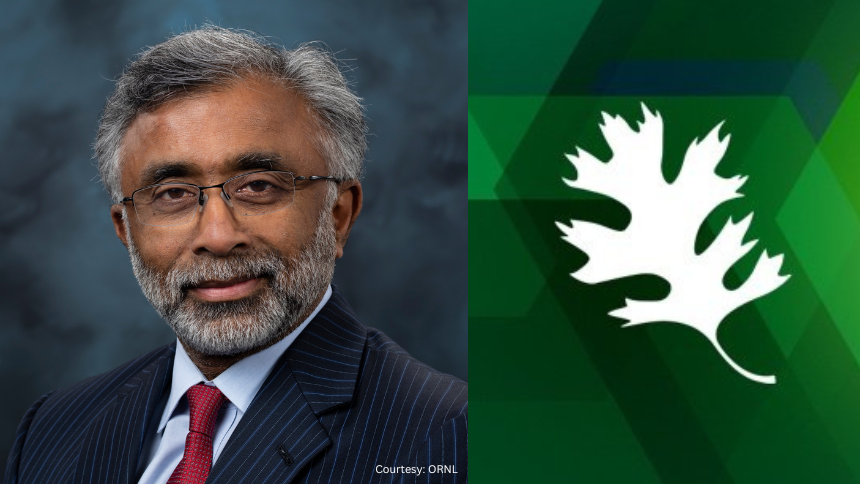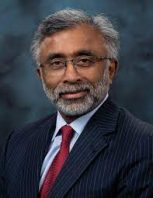
Thomas Zacharia reflects on 35 years at ORNL, region’s progress and possibilities as an innovation hub
The lab director retired on December 31 after five years in ORNL's top role.
Across the country and, for that matter, the globe, Thomas Zacharia has been an outspoken champion of the Knoxville-Oak Ridge region in a number of very different ways.
We had the opportunity in mid-December to chat with the Director of Oak Ridge National Laboratory (ORNL) in the last few weeks of his 35-year career that began when Zacharia, his wife, Sindhu, and their young daughter arrived in town in their Volkswagen Rabbit. Zacharia said the vehicle held all of their possessions and still had available space.
Over the next more than three decades, he had the vision and led the effort to build ORNL’s high-performance computing complex that has consistently produced a series of the world’s fastest computers. Zacharia oversaw a growth spurt at the lab that added approximately 1500 employees in the last five years, all working on very important projects related to national interests and each individual drawing an average annual salary of $125,000.
He was the person who connected with Brad Feld, Co-Founder of Techstars, and championed the idea of the global organization operating one of its programs in the local region. Today, Knoxville-Oak Ridge is home to the “Techstars Industries of the Future Accelerator,” the smallest community in the world to host one of the three-month programs. During that journey, Zacharia recruited two other Chief Executive Officers (CEOs) – Randy Boyd, President of the University of Tennessee (UT) System, and Jeff Lyash, President and CEO of the Tennessee Valley Authority (TVA) – to commit financial support to the endeavor.
 “What Techstars brings with it is that you are seen internationally and that gains you greater credibility,” Zacharia says. More recently, ORNL has also forged another strong relationship with The Global Institute on Innovation Districts and Julie Wagner, its President, who visited the region in August 2021. Wagner formerly worked for the Brookings Institution and co-authored the June 2014 report titled “The Rise of Innovation Districts” with Bruce Katz.
“What Techstars brings with it is that you are seen internationally and that gains you greater credibility,” Zacharia says. More recently, ORNL has also forged another strong relationship with The Global Institute on Innovation Districts and Julie Wagner, its President, who visited the region in August 2021. Wagner formerly worked for the Brookings Institution and co-authored the June 2014 report titled “The Rise of Innovation Districts” with Bruce Katz.
Today, the Oak Ridge Corridor Innovation District is one of 23 members of the Global Network of Innovation Districts under Wagner’s organizational umbrella. “Having their seal of approval means we are now talked about in the same way as Grenoble Alpes in France and Be’er Sheva in Israel,” Zacharia explains.
During my second career at ORNL, I learned quickly that Zacharia was a visionary who saw opportunities where others only saw obstacles or challenges and who was not afraid of challenging tradition when it was for the long-term greater good. Those “big idea” characteristics were no doubt enhanced during a little more than three year period (August 2012 to December 2015) when he was in the Middle East, serving as Executive Vice President for R&D at the Qatar Foundation and Chairman of the Qatar Science & Technology Park.
In fact, Zacharia acknowledged that his return to ORNL after his time in Qatar provided strong evidence of what could be achieved in building an innovation hub around assets like ORNL, UT, and TVA.
“There are certain unique ways an institution like ORNL can help,” Zacharia says, adding, “To be seen, to be heard, you have to have a presence.”
One of those initiatives was joining with TVA and UT to commission Techstars to do an assessment of the Knoxville-Oak Ridge region. The report, released about two years ago, found a number of strengths – the vibrant local research community, regional quality of life, low cost of living, deep technology talent, and existing support organizations for start-ups, but also identified several key gaps. In addition to the always-cited deficit in capital for start-ups, a key finding was the perception of the region, locally and more broadly.
What sort of progress has been made on the perception issue? A 2019 Brookings Institution report called for 10 new regional “growth centers” across America’s heartland and named the Knoxville-Oak Ridge region as one of those potential hubs among 45 or so communities. Just a month ago in a report from the Economic Innovation Group, the region jumped from the top 50 to the top 10, critical progress as Congress considers appropriating funding for 10 innovation hubs authorized under the “Creating Helpful Incentives to Produce Semiconductors and Science Act of 2022,” better known by the acronym CHIPS.
Programs like the Techstars accelerator, ORNL’s “Innovation Crossroads” program, and the new “Spark Cleantech Accelerator,” coupled with enhanced ways to tell the region’s story, have clearly moved the proverbial needle.
As he reflected on what has been accomplished in the region in the past few years, Zacharia starts with using the “blessed” word in describing both his career and the Knoxville-Oak Ridge region. “All it takes is a few stakeholders to move a region forward,” he says, adding, “Conditions in Knoxville have never been better. The region has a lot to offer. Success builds on success.”
Zacharia’s involvement with the regional proposal under the federal “Build Back Better” initiative, led by the East Tennessee Development District, provided insights on the challenges facing rural areas. “We have our share of the missing millions — those who are yet to be engaged for the innovation workforce,” Zacharia notes.
He talked a good deal about the importance of workforce development, explaining that “it’s not all about Ph.Ds.,” but also includes programs offered by two-year colleges.
As you might imagine, Zacharia encouraged community leaders to continue being aggressive. “We can’t commit ourselves to analysis paralysis,” he said, urging leaders to instead “commit to their North Star. Standing still is not an option.”
Many would characterize the Solway Bridge that separates Anderson and Knox Counties as an impediment to collaboration. “Are we Oak Ridge? Are we Knoxville? In the end, it doesn’t matter,” he believes.
So, what comes next?
Zacharia said there are three options. One is to stay here, another is to move to Seattle where their grandson lives, and the third is to relocate somewhere else. It will all depend on being “gainfully engaged” in something not only meaningful but that makes a difference and a significant impact.
Regardless, he says simply, “I will always champion this region no matter where we are.”
Like what you've read?
Forward to a friend!

